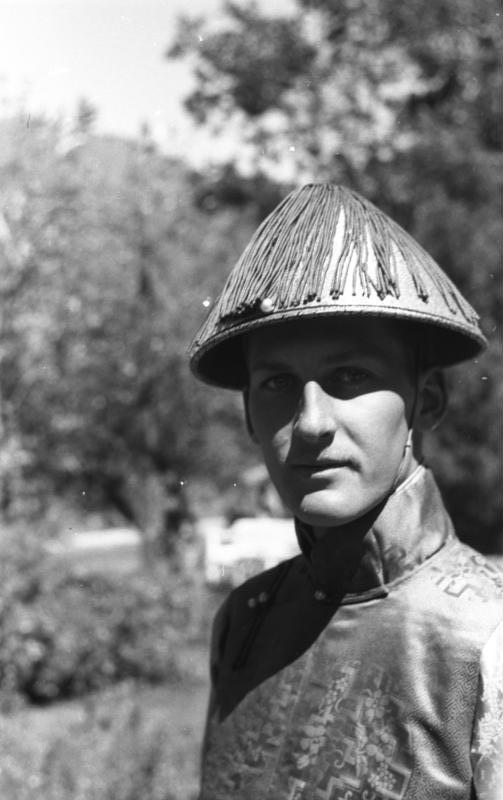 |
| Unknown MI6 assasin somewhere in Asia |
R. C. Zaehner was an Oxford don specializing in
various "Eastern" religions, such as Zoroastrianism and Hinduism. In
his book "Evolution in Religion", Zaehner comes across as the
classical distracted professor, who thanks his Indian hosts for driving him to
the local railway station, or he would probably have taken the wrong train. The
book itself consists of lectures, which sound exactly how we expect university
lectures to sound like: rambling, incoherent, with a stark air of
pseudo-profundity. The distracted professorial quality comes across even more
in Zaehner's eclectic blend of Roman Catholicism, Teilhard, Marxism and
God-knows-what-else.
According to Wikipedia, Zaehner was actually a MI6 intelligence officer in northern Iran during World War II, battling both Nazis and Communists. Later, he was training anti-Communist Albanian insurgents at Malta. The "distracted Marxist scholar" was also involved in a British attempt to overthrow left-leaning (and democratically elected) Iranian leader Mossadeq...
I admit "Evolution in Religion" is a perfect cover. I also admit that I would have felt compelled to push Mr Zaehner under one of those Indian trains at that railway station! For the Mossadeq thing, obviously. Ironically, the author was briefly under suspicion for being a double agent, working for the Soviets, but he was exonerated after an informal MI6 interrogation. Maybe somebody at the SIS actually read the don's distracted, pro-Marxist books?
And now, the book itself. As I already indicated, "Evolution is Religion" is pretty bad. It's ostensibly a comparative study of two great proponents of a spiritual-evolutionary synthesis, Pierre Teilhard de Chardin and Aurobindo Ghose. However, most of it is virtually unreadable due to the author's rambling, disjointed style. Zaehner seems to be a follower of Teilhard, and the most readable chapter is, I presume, an exegesis of the controversial French Jesuit's message. I admit that this was an interesting read, but it's marred by the author's worthless lecturing overall.
Zaehner identifies the Christian Trinity with the Hindu concept (found in Aurobindo) of Sat-Cit-Ananda. The Father is Sat (Being), the Son is Cit (Consciousness or the Logos, from which Sakti or the creative force emerges), and Ananda (Love) is the Holy Spirit. Creation isn't entirely ex nihilo, since matter seems to exist prior to creation in an inchoate state. By a process Zaehner somewhat daringly likens to sexual intercourse (daringly for a Christian, at least), God impregnates matter (esoterically symbolized by the Virgin Mary!) and a downward process of involution begins. At its lowest point, Spirit forgets its heavenly origins, until the arrival of humanity through a protracted process of evolution. The "Fall" was a fall from a kind of animal-like, collective unconscious to a fully individualized consciousness, a fall "upwards" which contained both new dangers and possibilities. The snake in the Garden and Yahweh are really two aspects of the same god, while Yahweh has both a masculine and a feminine side. Man's view of God (or perhaps God himself) evolves, with the God of the Old Testament still being something of a capricious bully, a bit like Rudra in Hindu mythology. The goal of evolution seems to be the creation of a communist and collectivist (but not Stalinist) society, and eventually the spiritualization of matter.
So far, Zaehner's private theology could presumably be squared with that of Sri Aurobindo. However, Zaehner believes that God has intervened directly in the evolutionary process, and that the Superman (a term derived from Aurobindo) has already arrived. The Superman, of course, is Jesus Christ. By his complete sacrifice on the cross, even to the point of destroying his own atman, and the subsequent resurrection in a glorified body, Jesus has somehow released matter from its fallen stated and helped evolution along. Jesus has also redeemed the fallen spirits, something he did by descending to Hell. Unless the old agent is hiding something, Zaehner regards the Gospel stories as (more or less) literally true. However, he also sees esoteric symbolism in the Bible, such as Jesus being a carpenter (i.e. a demiurgic refashioner of matter) sacrificed on a cross (the cross of matter, at which Spirit is "sacrificed" by its descent). The cross, of course, is made of wood, the chosen medium of the carpenter, and at one point, Zaehner actually writes that Jesus was crucified on a cross of his own making!
Exactly how Jesus has aided evolution along is less clear, since the world (at least arguably) is just as bad as it was 2,000 years ago. Zaehner acknowledges this, but believes that Jesus set new evolutionary impulses in motion. One of them is the Church, where Christ is mystically present. Zaehner feels uneasy about some aspects of Teilhard's and Aurobindo's thought. He doesn't seem to like their idea of evil as inevitable, perhaps even as somehow "good". As an evolutionist, Zaehner doesn't see any good way around it, however. In the end, he has an apocalyptic perspective, apparently also derived from Teilhard, where a good minority somehow disconnects itself from a cosmos gone completely evil...
I admit that Zaehner's theological speculations, give or take a few ideas, are similar to my own. However, due to the generally unreadable and confused character of "Evolution in Religion", I will nevertheless only give it two stars. Due to that, and to the Mossadeq thing!
No comments:
Post a Comment